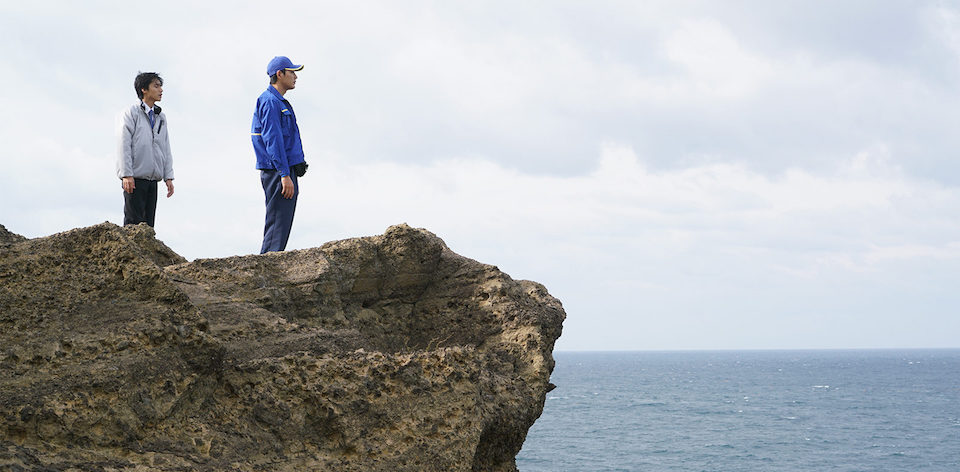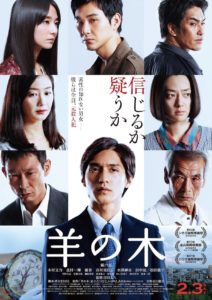Rural depopulation is a real problem in Japan, with towns outside the major cities in imminent danger of ageing out. Kazuhiro Soda has extensively observed the problem in documentaries like Inland Sea, but Daihachi Yoshida’s darkly comic drama follows a very different path.
Based on the manga by Tatsuhiko Yamagami and Mikio Igarashi, THE SCYTHIAN LAMB (羊の木) takes place in the port city of Uobuka. City employee Hajime Tsukisue (Ryo Nishikido) is tasked with relocating six strangers in town. He soon learns that each of the new residents is an ex-prisoner convicted of murder. The condition of their parole is that they stay in Uobuka for 10 years. The prisoners are not meant to know of each other’s situation.
The title, which also translates as ‘Tree of Lambs,’ comes from the legend of the Scythian Lamb, also known as the Vegetable Lamb of Tartary. The story goes that sheep were connected to the titular plant by an umbilical cord of sorts, giving them enough tether to graze the land surrounding it. Here that symbiotic relationship is used as an analogy for the new inhabitants of the town. They become tethered to it, but both they and the town grow as a result, impacting Tsukisue’s life and that of Uobuka.
The eclectic characters are probably given more time to develop in the manga, but here Masahito Kagawa’s screenplay concentrates primarily on Tsukisue and his relationships with his old classmate Fumi (Fumino Kimura), and ex-con Ichiro Miyakoshi (Ryuhei Matsuda). Yet we get some fun storylines in Ono (Min Tanaka), a reformed yakuza with a facial scar, the rough around the edges Sugiyama (Kazuki Kitamura), and Rieko Ota (Yuka), who starts a romance with Tsukisue’s stroke-suffering father!
Structured around a ceremony paying tribute to local deity Nororo, whose statue ominously looms over the horizon in many shots, cinematographer Akiko Ashizawa (Before We Vanish) often casts the night in inky blackness. The humour of Masahito Kagawa’s screenplay sometimes inhabits this murky territory, especially the dramatic ending that combines the goofs of the first half with the drama and intrigue of the second.
Wrapping up with one of the best uses of a Nick Cave and the Bad Seeds track (“Death Is Not the End”) since Wim Wenders, it’s the punchline to a dark joke that might toy with the idea of fate and weakness, but refuses to topple over completely into nihilism. Nororo doesn’t escape as easily.
[stextbox id=”grey” bgcolor=”F2F2F2″ mleft=”5″ mright=”5″ image=”null”] 2018 | Japan | DIRECTOR: Daihachi Yoshida | WRITERS: Masahito Kagawa (Based on the manga by Tatsuhiko Yamagami and Mikio Igarashi) | CAST: Ryo Nishikido, Fumino Kimura, Kazuki Kitamura, Mikako Ichikawa | DISTRIBUTOR: Asmik Ace Entertainment (JPN), New York Asian Film Festival (US) | RUNNING TIME: 126minutes | RELEASE DATE: 2 July 2018 (NYAFF)[/stextbox]
2018 | Japan | DIRECTOR: Daihachi Yoshida | WRITERS: Masahito Kagawa (Based on the manga by Tatsuhiko Yamagami and Mikio Igarashi) | CAST: Ryo Nishikido, Fumino Kimura, Kazuki Kitamura, Mikako Ichikawa | DISTRIBUTOR: Asmik Ace Entertainment (JPN), New York Asian Film Festival (US) | RUNNING TIME: 126minutes | RELEASE DATE: 2 July 2018 (NYAFF)[/stextbox]






